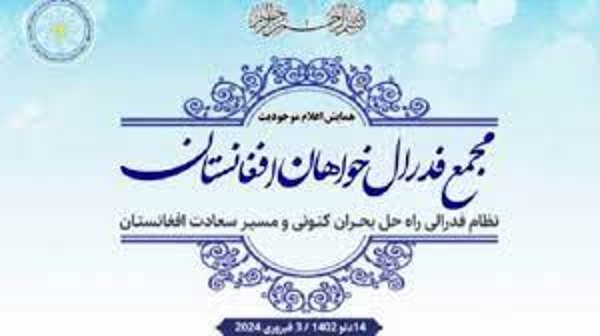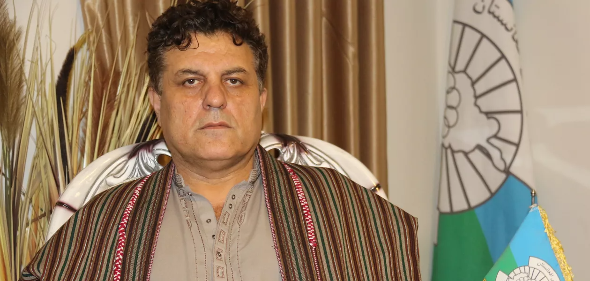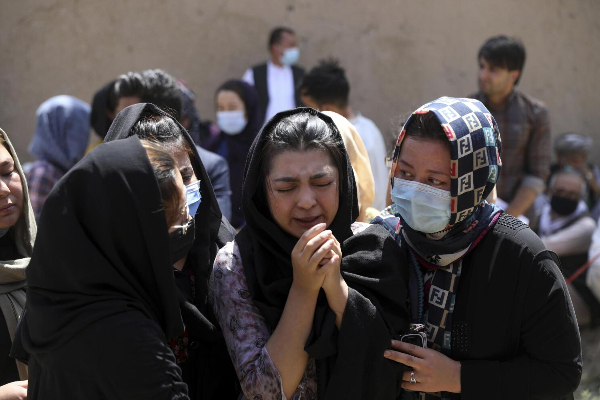Afghan President Ashraf Ghani has accused neighboring Pakistan of instigating an “undeclared war of aggression” against his country after a series of deadly bombings in the capital Kabul in the past week.
Addressing a peace conference in Kabul attended by foreign delegates from about two dozen countries on Tuesday, Ghani called on the world to make to make good on a promise to end state-sponsored terrorism.
The remarks came after Afghanistan’s intelligence service know as Afghanistan's National Directorate of Security (NDS) blamed the Taliban-allied Haqqani terrorist network for a bombing outside the diplomatic Green Zone in Kabul on Wednesday.
The deadly explosion claimed lives of at least 150 people and wounded more than 450.
The Haqqani network, founded by Jalaluddin Haqqani, is a militant group operates on both the Pakistan and Afghan side of the border. Afghanistan blames elements inside the Pakistani spy agency Inter-Services Intelligence (ISI) for maintaining ties with the network.
The deadly attack was followed by three blasts on Saturday at a funeral attended by senior Afghan politicians, including Chief Executive Abdullah Abdullah, who escaped unharmed.
The Kabul government said the funeral was targeted by bombers trained at a seminary by Wahhabi zealots in Pakistan.
Reacting to allegations on Sunday, the Pakistani premier's adviser on national security and foreign affairs, Sartaj Aziz, in a statement said that he “strongly rejected the baseless and unfounded allegations” that Pakistan had any involvement with the May 31 bombing.

In addition, Pakistan military also said in a statement that Ghani’s accusations and threats were “unwarranted.”
Instead of blaming Pakistan, Afghanistan needs to look inward and identify the real issues, the statement read.
Pakistan’s military earlier had blamed Afghanistan of harboring militants it said were responsible for a spate of deadly bombings across Various regions of Pakistan in February.
The developments come as the two nations have also engaged in a series of deadly cross-border clashes this year.
In late May, Pakistan reopened a major border crossing with Afghanistan more than three weeks after several people were killed when troops from both sides exchanged fire for several hours.
Pakistan and Afghanistan regularly accuse each other of sheltering their enemy insurgents. Both sides, however, deny such an allegation.
Kabul blames elements the Pakistani spy agency, the ISI, for supporting the Taliban militants, while Islamabad blames the Afghan government for giving refuge to militants on its side of the border. The two sides also accuse one another of not doing enough to stop militants engaging in cross-border raids.
Afghanistan has been gripped by insecurity since the United States and its allies invaded the country as part of Washington’s so-called war on terror in 2001. Many parts of the country remain plagued by militancy despite the presence of foreign troops.

During the past 16 years, the Taliban militants have been conducting terrorist attacks across the country, killing and displacing civilians.
In addition, the Daesh Takfiri terrorist group, which is mainly active in Syria and Iraq, has recently managed to take recruits from Afghan Taliban defectors.
Militants are now launching attacks on both Pakistani and Afghan soil.
LINK: https://www.ansarpress.com/english/6935
TAGS:































 Ghani Removed From UN Heads of State List
Ghani Removed From UN Heads of State List 




